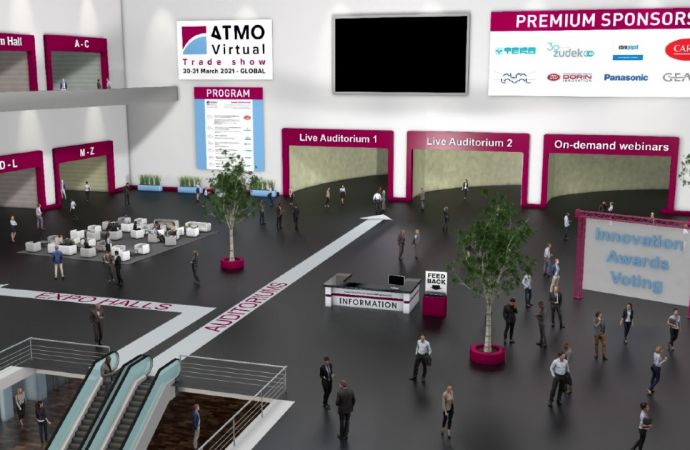Whether it’s CO2 or hydrocarbons, Delhaize made its plans clear to introduce as many natural refrigerant solutions as possible and use ATMO Asia 2016 as a platform to learn from Japanese retailers, particularly CVS operators.

Playing something of an ambassadorial role during a panel discussion at the Tokyo conference, Delhaize’s Georgios Patkos was eager to learn about the experiences of Japanese CVS retailers as the European giant investigates trialling solutions for its 130 stores in Indonesia.
As such, the event provided the perfect discussion platform for the Delhaize Group, who, like Lawson (via its Alfamidi chain), is intent on spreading its technology expertise to Southeast Asia. Thankfully, both Lawson and Alfamidi sent representatives to Tokyo, who were able to share in their lessons learned.
Patkos also announced the Delhaize Group’s plans to introduce natural refrigerant technology in its warehouses and transport refrigeration as well as goals to improve system efficiency, test ejector performance and roll out R290 and CO2 plug-ins in almost all of its stores.
Delhaize has installed eight CO2 transcritical systems (plus 48 hybrid systems) in Belgium, three CO2 transcriticals in the US and 93 propane (R290) units in Romania. Patkos went on to announce plans to install further CO2 TC systems in the US, Romania, Greece (2016) and Serbia (2017).
The Belgian retailer has reduced energy consumption by 40% across its CO2 transcritical stores and urged Japanese retailers to continue introducing CO2 technology even in the face of restrictions imposed by Japan’s High Pressure Gas Safety Act.
“We are planning a store this year with an integrated system […] it will be opened in a few months,” Patkos said.
COOP Mirai, Marukyu at forefront of domestic race to adopt CO2…
On the domestic front, one of the largest corporations in Japan, COOP Mirai, made its ATMO Asia debut and is just embarking on its own R744 journey.
As part of plans to slash its overall CO2 emissions by 15% by 2020 (compared to 2015 levels), COOP Mirai has installed one 20 HP and two 15 HP R744 units in one of its distribution centres. It will install CO2 technology in its first store in early 2016, where it expects to make energy savings of 27%.
“The reason for introducing CO2 is that global warming is something we need to address, as well as improving energy efficiency,” said COOP Mirai’s Tsutomu Saito.
Japanese retailer Marukyu cited a CO2 case study at its 15,000m2 store located in Hiroshima, which received a Japanese Ministry of Environment subsidy and has since recorded energy savings of 36%.
A strong commitment from supplier Panasonic and Marukyu’s ambition to support the local community by analysing customer needs at the Aruk Iguchi-myojin store helped to make a great success of the installation.
After engaging with customers, Marukyu decided to install sliding doors in its frozen food area, and fitted a Panasonic efficiency monitoring system, in order to reduce costs.
…alongside AEON
AEON’s Haruko Kanamaru said the company would continue to use natural refrigerants in all its new stores, as well as converting an existing 3,500 stores. Yet high initial costs and Japan’s High Pressure Gas Safety Act have slowed down AEON’s progress since it became the first chain to install a CO2 supermarket system in Japan in 2011.
Kanamaru insisted the company would “continue to work with the government and the community to further implement [natural refrigerant technology] in different formats,” but added that it had made little headway in terms of cost reductions for different formats and sizes of store.
AEON opened a flagship store incorporating 82 natural refrigerant showcases two years ago. The high efficiency of the systems convinced the firm it had made the right decision. But it nonetheless sees the importance of Japanese Environment Ministry subsidies to supplement initial investment and running costs of CO2 technology.
Stan Mah, president of Coca-Cola Tokyo Research and Development Inc., presented the Coca-Cola Company’s global strategy to phase out HFCs and adopt natural refrigerant technology (predominantly CO2). In 2015, the company committed to natural refrigerant technology for all new vending machines, and plans to ensure that from 2020 all of its vending machines use natural refrigerants – including its innovative ‘peak-shift’ technology.
Delhaize outlined its plans in more detail in the first edition of Accelerate Europe, published in December 2015.
As such, the event provided the perfect discussion platform for the Delhaize Group, who, like Lawson (via its Alfamidi chain), is intent on spreading its technology expertise to Southeast Asia. Thankfully, both Lawson and Alfamidi sent representatives to Tokyo, who were able to share in their lessons learned.
Patkos also announced the Delhaize Group’s plans to introduce natural refrigerant technology in its warehouses and transport refrigeration as well as goals to improve system efficiency, test ejector performance and roll out R290 and CO2 plug-ins in almost all of its stores.
Delhaize has installed eight CO2 transcritical systems (plus 48 hybrid systems) in Belgium, three CO2 transcriticals in the US and 93 propane (R290) units in Romania. Patkos went on to announce plans to install further CO2 TC systems in the US, Romania, Greece (2016) and Serbia (2017).
The Belgian retailer has reduced energy consumption by 40% across its CO2 transcritical stores and urged Japanese retailers to continue introducing CO2 technology even in the face of restrictions imposed by Japan’s High Pressure Gas Safety Act.
Our aim is to lead the way, help transform the marketplace, and show others what is possible. We shouldn't be afraid. An entrepreneur is someone who takes risks – we have to analyse the market, but sometimes you have to take the risk.”
“We are planning a store this year with an integrated system […] it will be opened in a few months,” Patkos said.
COOP Mirai, Marukyu at forefront of domestic race to adopt CO2…
On the domestic front, one of the largest corporations in Japan, COOP Mirai, made its ATMO Asia debut and is just embarking on its own R744 journey.
As part of plans to slash its overall CO2 emissions by 15% by 2020 (compared to 2015 levels), COOP Mirai has installed one 20 HP and two 15 HP R744 units in one of its distribution centres. It will install CO2 technology in its first store in early 2016, where it expects to make energy savings of 27%.
“The reason for introducing CO2 is that global warming is something we need to address, as well as improving energy efficiency,” said COOP Mirai’s Tsutomu Saito.
Japanese retailer Marukyu cited a CO2 case study at its 15,000m2 store located in Hiroshima, which received a Japanese Ministry of Environment subsidy and has since recorded energy savings of 36%.
A strong commitment from supplier Panasonic and Marukyu’s ambition to support the local community by analysing customer needs at the Aruk Iguchi-myojin store helped to make a great success of the installation.
After engaging with customers, Marukyu decided to install sliding doors in its frozen food area, and fitted a Panasonic efficiency monitoring system, in order to reduce costs.
…alongside AEON
AEON’s Haruko Kanamaru said the company would continue to use natural refrigerants in all its new stores, as well as converting an existing 3,500 stores. Yet high initial costs and Japan’s High Pressure Gas Safety Act have slowed down AEON’s progress since it became the first chain to install a CO2 supermarket system in Japan in 2011.
Kanamaru insisted the company would “continue to work with the government and the community to further implement [natural refrigerant technology] in different formats,” but added that it had made little headway in terms of cost reductions for different formats and sizes of store.
AEON opened a flagship store incorporating 82 natural refrigerant showcases two years ago. The high efficiency of the systems convinced the firm it had made the right decision. But it nonetheless sees the importance of Japanese Environment Ministry subsidies to supplement initial investment and running costs of CO2 technology.
Stan Mah, president of Coca-Cola Tokyo Research and Development Inc., presented the Coca-Cola Company’s global strategy to phase out HFCs and adopt natural refrigerant technology (predominantly CO2). In 2015, the company committed to natural refrigerant technology for all new vending machines, and plans to ensure that from 2020 all of its vending machines use natural refrigerants – including its innovative ‘peak-shift’ technology.
Delhaize outlined its plans in more detail in the first edition of Accelerate Europe, published in December 2015.
MORE INFORMATION
Related stories



